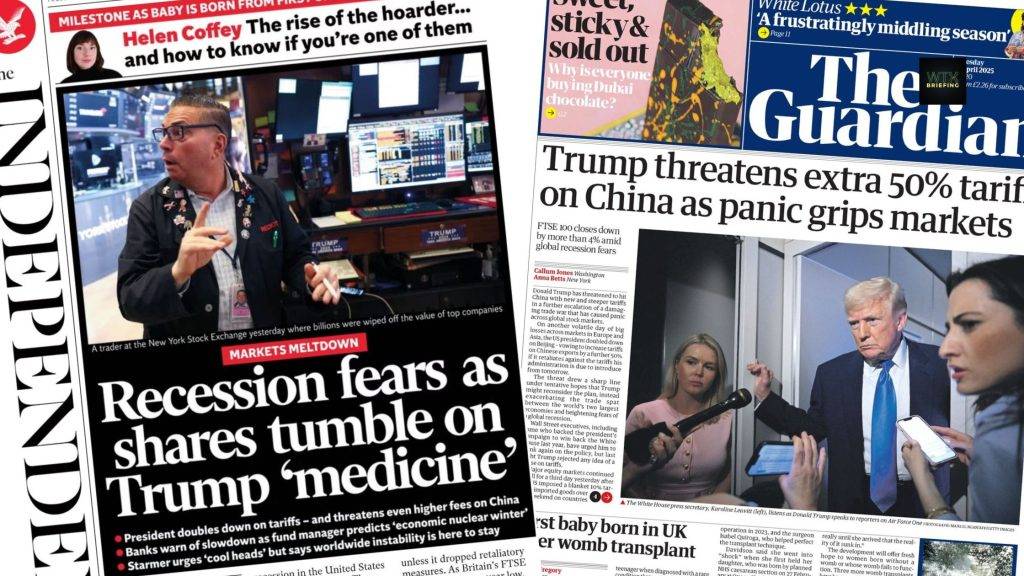Tuesday’s newspapers are, unsurprisingly, focused on the market chaos caused by last week’s US tariffs. Several headlines look at the growing trade war between the two largest economies in the world as China retaliated with their own tariffs on the US – which led to Donald Trump telling them to back down from their tariffs or face a further 50% tariff on Wednesday. China has said it won’t back down.
The Asian and European markets opened with more optimism this morning, after a day of ups and downs on Monday after a false rumor spread that Trump was considering a pause on tariffs – later in the day it was acknowledged the information was false.
Trillions have been wiped off the global markets since last week, and all eyes will be on the US markets when they start trading (14:30 BST).
There has been some market calming after reports that deals are being made between the US and Japan, and the EU said it was ready to negotiate. However, experts have warned that the markets remain volatile.
Stock markets react as tariff war heats up





Billions wiped off pensions amid worldwide stock market turmoil
Explainer: The headline is biased as it uses the phrase “wiped off” to create a sense of loss and urgency, framing the stock market turmoil in a highly negative and dramatic light. This language could evoke fear or concern, emphasising the impact on pensions without offering a full picture of the reasons behind the market fluctuations or the potential for recovery.
- The i reports that as stock markets around the world slid, Donald Trump vowed to stay the course with the paper noting that billions were wiped off pensions. The paper looks at Monday’s trading for Asian, British and US markets and fears of a recession.
Trump issues new China tariff threat
Explainer: The headline is biased as it uses the word “threat,” which conveys a sense of aggression or confrontation, framing Trump’s actions in a negative, confrontational light. This choice of language may evoke an emotional response, suggesting tension or conflict, rather than presenting the situation in a more neutral or analytical way.
- The FT looks at the escalating tariff war between China and the US after Trump threatened an additional 50% tariffs on China if Beijing did not withdraw its retaliatory levies. China has said it will not back down. US stocks closed slightly lower after a day of volatile trading.
GLOBAL MARKETS PLUMMET OVER U.S. TARIFFS: Trump’s ‘medicine’ helps the world’s economy go down
Explainer: The headline uses the term “plummet” to emphasise a dramatic negative effect on global markets, which may create a sense of panic or alarm. The headline lacks nuance and could oversimplify the consequences of the tariffs.
- Metro reports on Trump’s message that the tariffs are “medicine” that will make the US wealthier than ever before. The paper says the US president has defended his trade war with the world despite three days of “historic stock market slides.”
Trump threatens extra 50% tariff on China as panic grips markets
Explainer: The headline is biased as it uses the word “threatens,” which emphasises a confrontational and alarming tone, framing Trump’s actions as aggressive and potentially destabilising. The phrase “panic grips markets” amplifies the sense of fear and chaos, implying an emotional response rather than focusing on the economic or political context.
- The Guardian leads on the denial that there could be a pause on tariffs to allow for negotiations. Trump said on Monday, “We’re not looking at that.”
Trump: Don’t be a PANICAN*
*A new party based on weak and stupid people‘ criticising his tariff agenda
Explainer: The headline uses highly charged language like “PANICAN,” “weak,” and “stupid,” which frames the people criticising Trump’s tariff agenda in a derogatory and dismissive manner. The headline presents Trump’s viewpoint in an exaggerated, inflammatory way, aiming to provoke an emotional response from the reader.
- The Daily Telegraph leads on Trump’s call for Americans not to panic despite trillions of dollars being wiped from the global markets by the “tariff onslaught.” In an apparent reference to his own Republican Party, the US president told critics not to be “a Panican” – coining a new phrase which he described as “a new party based on weak and stupid people”.
No pause in tariffs, vows Trump as stocks sink
Explainer: The headline is biased as it contrasts Trump’s firm stance on tariffs with the negative effect on the stock market, using “sink” to suggest a dramatic and ongoing decline. This language creates a negative emotional response, implying that Trump’s decision is directly causing harm to the economy.
- The Times leads with Trump’s insistence that there would be no pause in tariffs as he demanded China back down in the trade war or face a further charge of 50%.
Recession fears as shares tumble on Trump ‘medicine’
Explainer: The headline uses charged language “tumble” and “fears”. The phrase “recession fears” amplifies anxiety, suggesting an impending economic downturn.
- The Independent says that as Trump doubles down on tariffs, banks have wanted a slowdown, and experts predict an ‘economic nuclear winter’. The paper highlights that the prime minister has urged ‘cool heads’ but also noted that the worldwide instability is here to stay.


